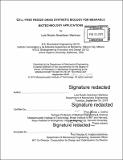Cell-free freeze-dried synthetic biology for wearable biotechnology applications
Author(s)
Soenksen Martinez, Luis Rubén.
Download1196353141-MIT.pdf (32.53Mb)
Other Contributors
Massachusetts Institute of Technology. Department of Mechanical Engineering.
Advisor
James J. Collins.
Terms of use
Metadata
Show full item recordAbstract
Synthetic biology aims to develop modular genetic networks for computation, sensing, and control of biological systems, holding great promise for next-generation biosensing platforms. Similarly, advances in material sciences have allowed for the design of substrates and textiles engineered to exhibit novel mechanical, electrical, and optical properties for sensing and actuation. Wearable biosensors using synthetic biology principles and smart materials could expand on this potential, especially as solutions for continuous, fine-grained monitoring of physiological status, disease states, and pathogen/toxin exposure difficult to assess with other methods. Despite this, only few examples of synthetic biology sensors compatible with wearable use-cases have been described, all of which rely on the use of live engineered bacteria with sustainment limitations. Thus, we report on the development of novel shelf-stable, genetically-programmable, and highly sensitive wearable sensing platforms based on cell-free synthetic biology components freeze-dried into flexible substrates and textiles; as well as on a new class of smart programmable synthetic biology materials capable of reacting to environmental queues. These systems were designed to exhibit colorimetric, fluorescent, luminescence, electrical, or mechanical outputs that can be passively or actively interrogated within isolated modules or in larger-scale garments with wireless networking capabilities. We functionally validated such platforms using a variety of synthetic biology circuits for detecting several relevant environmental exposure targets such as metabolites, chemicals, and pathogen-associated nucleic acids. These findings suggest that cell-free synthetic biology tools have the potential to enable highly programmable wearable systems for rapid on-body detection or adaptation to external threats in first responders, warfighters or clinical personnel, as well as the assessment of athletic performance and monitoring to complex disease states.
Description
Thesis: Ph. D., Massachusetts Institute of Technology, Department of Mechanical Engineering, 2020 Cataloged from PDF of thesis. "February 2020." Includes bibliographical references (pages 163-173).
Date issued
2020Department
Massachusetts Institute of Technology. Department of Mechanical EngineeringPublisher
Massachusetts Institute of Technology
Keywords
Mechanical Engineering.